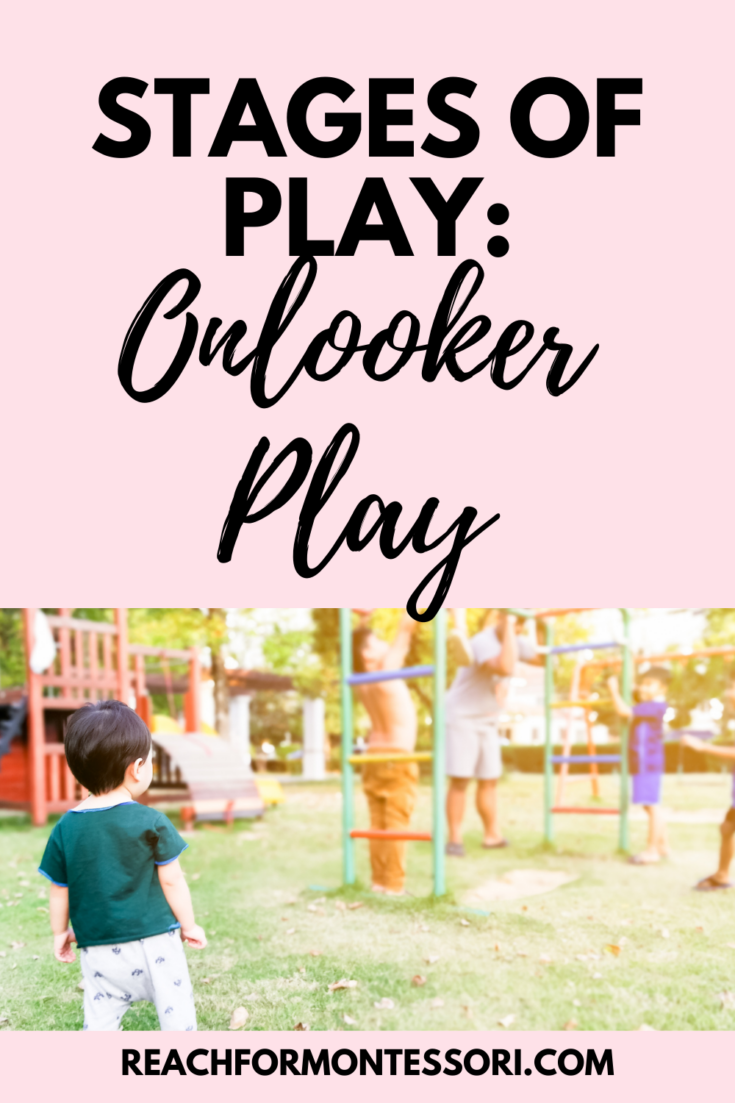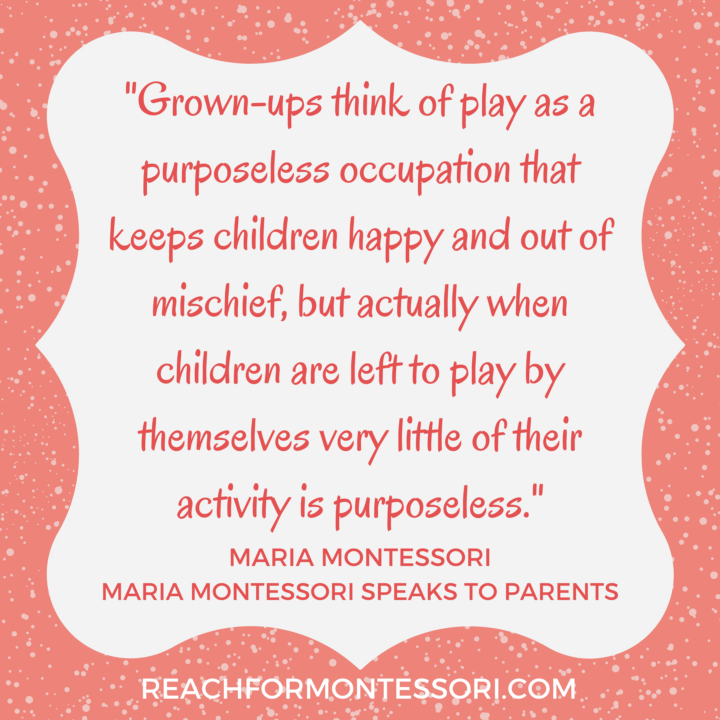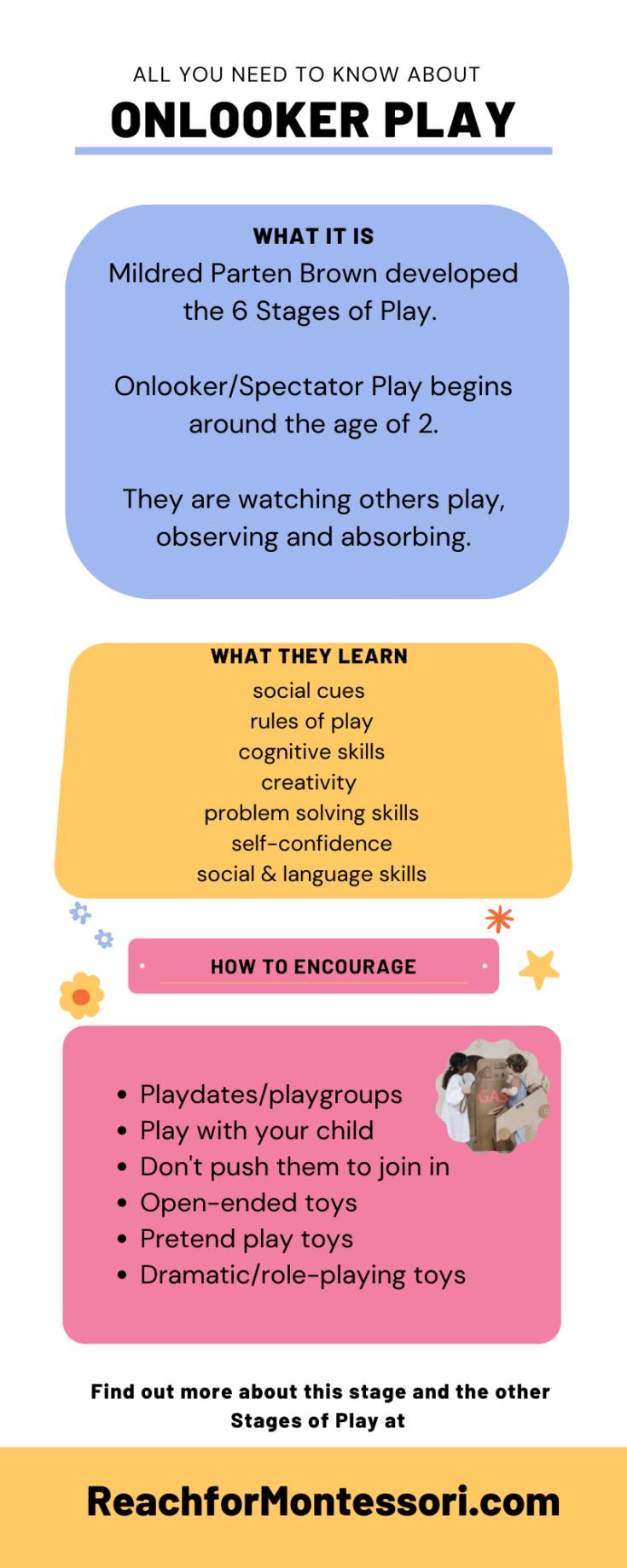All You Need to Know About Onlooker Play — The Montessori-Minded Mom
[ad_1]
In this write-up, you will master all about the developmental stage of perform termed Onlooker Play. You will master what it is, at what age it happens, and you will get some concepts on how to aid this sort of engage in in your toddler.

(This publish consists of affiliate inbound links. Obtaining from these back links prices you practically nothing added, but will help with our web page upkeep.)
Listed here at the Montessori-Minded Mom, we have frequently mentioned the relevance of Free Engage in. Boy or girl-led play is vital for any boy or girl, at any stage.
Participate in has connections to better psychological regulation, inventive thinking, and amplified language and social capabilities. For the duration of engage in, they are learning so a lot much more than we recognize.

What is Onlooker Participate in?
Onlooker, which is sometimes referred to as Spectator Engage in, is one particular of the 6 Levels of Perform designed by sociologist, Dr. Mildred Parten Newhall. The other 5 phases of play are:
Browse extra about the 6 Phases of Play listed here.
Onlooker/Spectator engage in usually begins sometime about the age of 2. For the duration of this phase, they are only looking at other little ones perform. They are observing what the other youngster(ren) are performing and getting it all in.
The child will stand at a at ease length, where by they can listen to the boy or girl(ren). They could request concerns, or speak to the other boy or girl(ren), but will not join in.
Just like through infancy’s unoccupied perform, they have a normal motivation to enjoy and study.
Onlooker perform will usually overlap with the independent enjoy stage and could continue as they development to the future stage.
Case in point:
When my daughter was youthful, I took her to the playground where she viewed two more mature preschoolers engage in “restaurant” at a window-kind opening on the playscape.
She did not want to be part of in, and I highly regarded that. She appreciated watching them from a small distance, smiling and laughing at what they ended up performing.
The upcoming time we went to the playground, she made use of the window in the very same way, including on her personal strategies by working with rocks as dollars.
Now at 3.5 yrs previous, she nevertheless uses the window as a cafe and contains her youthful sister or other young children.
Why Is Onlooker Perform Essential?
You may possibly be inquiring yourself: “But never we want our young children to enjoy with other youngsters?” or “What are they obtaining out of just looking at?”
Perfectly, the truth is, this phase is a very important milestone, and they are not able to development to the following phases without the need of initial creating skills by way of currently being an onlooker.
For the duration of this phase, they are paying out consideration to every thing the other young children are carrying out various strategies a little one may possibly be working with a toy, or how youngsters interact with just about every other.
During this phase they discover:
- social cues
- procedures of enjoy (I.e., getting turns)
- creativity
- social and language skills
- cognitive skills
- self-confidence
- issue-resolving skills
In some cases, mothers and fathers or caregivers imagine the child is just ”shy” and requirements to be pushed to be part of in. But resist the urge to drive the boy or girl into interacting. They could be just in this crucial stage of being a spectator.
I sense that it is worthy of mentioning that there is really very little erroneous with remaining or emotion shy, and it’s essential to regard a child’s boundaries.

How to Support Onlooker Engage in
This phase comes about naturally but as often, there are approaches to encourage your child’s improvement during this time.
- Playdates and playgroups. This may seem to be pointless if they are not taking part in jointly, but it provides them new prospects to be a spectator.
- Belief and assist your child. Rely on that when they’re all set, they will perform with other kids. Respect when they would like to view and let them know they can be a part of in when they want to.
- Enjoy with your youngster. While children have a tendency to find out additional from other small children through this stage, you even now can product playing to assistance them decide on up competencies. They will find out social capabilities and cues just by observing you as very well.
This doesn’t indicate you have to engage in with them all working day lengthy – we even now want to inspire impartial participate in.
But if you feel like your child is missing it out on probabilities to be an onlooker through engage in, it doesn’t damage to set aside some time to deliver that yourself.
Toys to Support Onlooker Engage in
Open up-finished toys
Open up-ended toys are toys that can be performed with in a wide variety of unique methods, allowing young children to be imaginative in their engage in.
Toys that have a person purpose or target, like puzzles or Montessori knobbed cylinders, are shut-ended toys.
Examples of open-finished toys:
Browse extra about open-ended toys and more of our tips below.
Pretend enjoy
Fake play is imaginative participate in using part-perform and sometimes item substitution. It is occasionally identified as make-believe or extraordinary participate in.
Examples of fake enjoy toys:
In a review by Jessica Hoffman and Sandra Russ, it was identified that fake participate in resulted in larger scores for psychological regulation and divergent wondering. Find that research listed here.
Young children have a purely natural instinct to engage in, but also to notice. By supporting this normal intuition, you will begin to see how their observations get started to demonstrate up in their own impartial engage in. As well, you will see how it prospects to the other phases of engage in.
As generally, it’s important to don’t forget that every baby develops at distinctive charges and some youngsters may just take a tiny longer to get to this phase.
Having said that, if you have any concerns relating to their reluctance to sign up for in, or if they don’t seem to be achieving this phase, it does not harm to point out it to your pediatrician.
[ad_2]
Resource url




